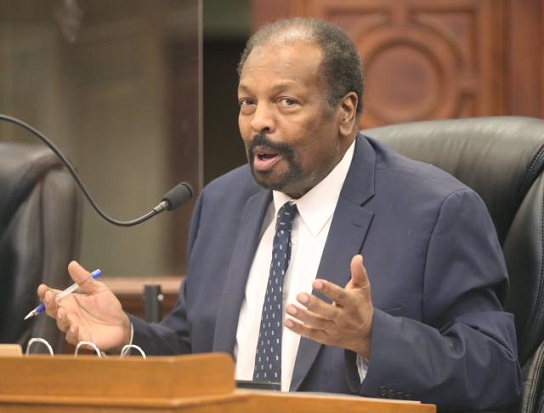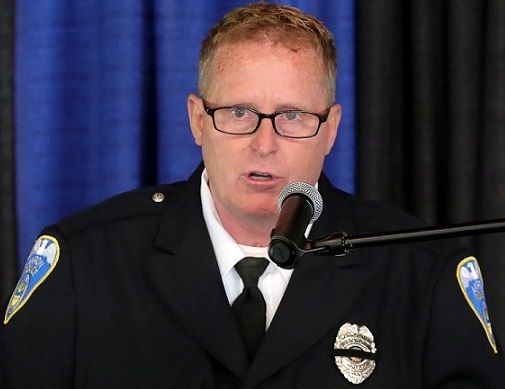Akron’s Police Oversight Board Approves Its Rules, Including Power To Investigate Akron Police!
FEATURED POLICE: AKRON’S THE CITIZENS POLICE OVERSIGHT BOARD

IdeastreamPublicMedia.org, By Anna Huntsman, Posted July 31st 2023
Akron’s new police oversight board has approved its official rules, including the explicit power to conduct investigations and issue subpoenas into police misconduct complaints.
The Citizens’ Police Oversight Board unanimously approved the rules this month during its meeting in city council chambers.
In spite of prior opposition from Akron’s police union, the rules state the board will conduct investigations separate from the police department’s own internal investigations unit, the Office of Professional Standards and Accountability.
This allows the board to provide truly independent oversight over the police department, said Bob Gippin, a member of the board who helped develop the rules.
“It may be that our investigation, I can see where it might be more comprehensive. It might be more accurate,” Gippin said. “Particularly, in terms of talking to people who either are the affected person or who are in support of the affected person, [they] may be much more willing to speak with our staff than with the police department.”
The rules will be now be submitted to Akron City Council for possible approval. The rules will be introduced as legislation in council’s public safety committee meeting on July 24.
The board was created in response to the fatal police shooting of Jayland Walker, although some activists and public officials had been calling for stronger oversight of the police department for years. In November of 2022, voters approved a charter amendment to create the review board, permanently codifying it in the city’s charter.
Some of the board’s rules were already clearly outlined in the charter amendment language, such as the board’s powers to hold regular meetings, appoint a chair and vice chair and set a budget.
Other rules were more broadly defined in the charter language, such as the board’s investigative and subpoena powers. Over the course of two months, board members worked together to better define those rules, ultimately deciding that the board has broad investigative authority.
“After looking at this very closely, and having all the discussion, hearing from the [Fraternal Order of Police,] and having discussions with law department lawyers, we came to the conclusion that that’s the correct interpretation of the charter,” Gippin said. “Given that that’s what we understand the community wants us to do, that’s why we made the decision we made.”
For years, Akron’s police auditor, Phil Young, was only permitted to review investigations after the police department completed them. The board believes the charter amendment approved by voters now gives the auditor – and the board, which oversees that office – more power, Gippin said.
The effort to write the rules was led primarily by the board’s governance committee, made up of board members Gippin and Brandyn Costa, both local attorneys, and Caitlin Castle, College Access Program Manager for Akron Public Schools.

The new rules give the board the power to, “on its own initiative,” investigate the police department “at any time” – meaning the police auditor’s office may investigate a police misconduct situation simultaneously as the police department reviews it.
The board oversees the Office of the Independent Police Auditor. The board will eventually hire a deputy auditor and an administrative assistant.
This office will primarily handle the investigations, rather than board members themselves, said Kemp Boyd, board chairman.
“One of our responsibilities is to actually build out the department of the police auditor. Once we do that, we believe that we will have the resources necessary to do the investigation, because those that we bring on, will have the experience of doing that,” Boyd said.
Currently, the board is planning to contract with local private investigative firm T. R. Fields & Associates to handle investigations for the time being while Young is out of the office recovering from an undisclosed illness.
The board will ask the independent police auditor’s office for regular updates on the investigations, then review the findings and issue recommendations for the police department when completed, Boyd said.
The new board rules also give the board and the auditor’s office authority to issue and serve subpoenas at any time, for the purpose of ether “compelling the attendance and testimony of witnesses” or production of photographs, video or audio recordings, and other records.
Neither will “interfere detrimentally” with any active investigations or violate the city’s collective bargaining agreement with the police department, the document states.
Representatives from the Fraternal Order of Police Lodge #7 addressed the board during a meeting in June.
President Clay Cozart and Susannah Muskovitz, the union’s attorney, advised the board not to do investigations at the same time as the police, in part because they might not have the same access to records that law enforcement has.

“You have no, sort of, protection that the investigation needs, the integrity the investigation needs, that is provided in Ohio to law enforcement agencies. And I think it’s a huge mistake,” Muskovitz said.
Muskovitz added that the union is prepared to challenge any of the board’s subpoenas in court and said the broad authority conflicts with the union’s collective bargaining agreement.
Gippin said he disagreed with the union’s stance because board does not have disciplinary power. They may be able to issue recommendations about policy changes or give input to the police chief, but they cannot issue discipline for any misconduct they determine to be in violation of the department’s rules, he said.
“I was not persuaded, as a lawyer, by their position. I don’t think it’s inconsistent because we don’t have disciplinary authority. We cannot make a decision that an officer gets fired,” Gippin said. “That’s still the process that’s in the [collective bargaining] agreement.”
The board’s rules also state the board must prepare an annual report for the mayor and city council by March 31 each year.
They also establish rules for the board’s meetings, requiring a public comment period and allowing flexibility for virtual meetings if need be.
Seven out of the 13 Akron councilmembers need to vote in favor of the rules for them to be officially adopted, Gippin added. He’s not sure that’ll happen.
“It’s not clear that there are seven votes, you know, and I think council, properly, will want to discuss this issue with us. That’s the process as it should be,” Gippin said.
Council may initially decide to take time to consider the rules and take a vote at a later meeting. Council does not meet during the month of August.
“It’s going to be what it’s going to be. We’ll make our best argument,” Gippin added.








